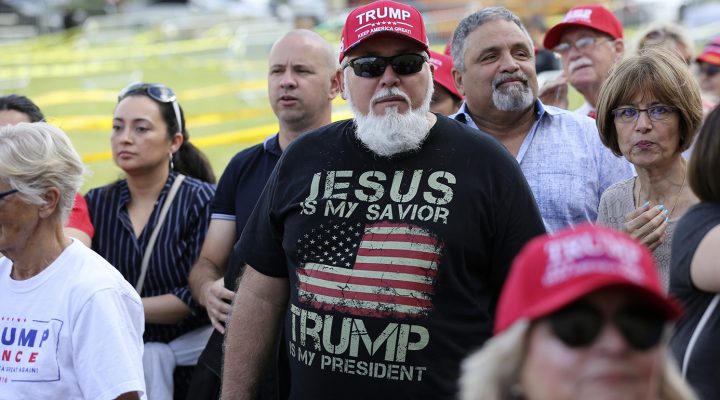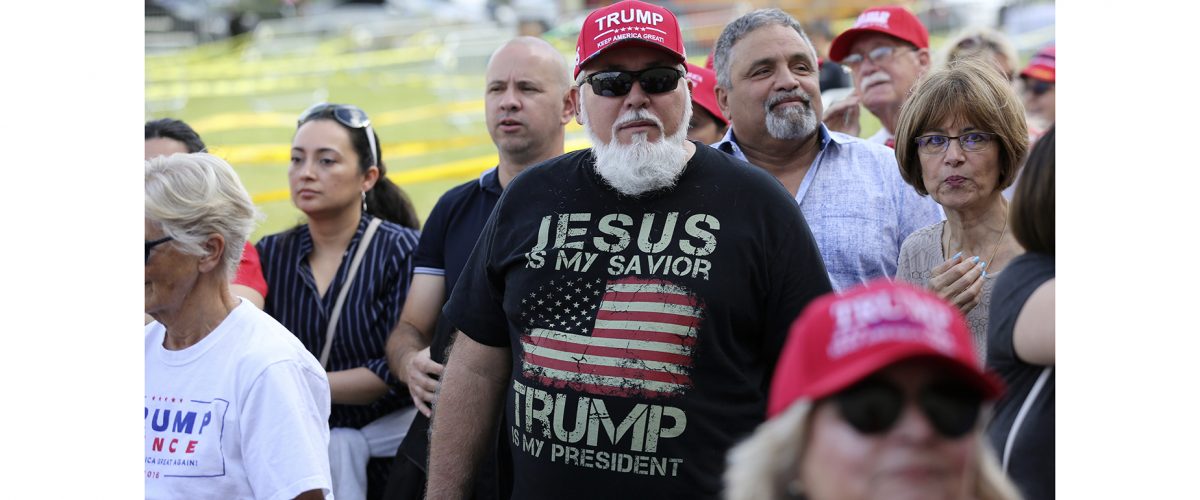Widespread evangelical support for Donald Trump — the twice-divorced presidential candidate who recently described his opponents as “vermin” — results from being shaped by culture more than by faith, a Christian author and scholar said during an Interfaith America podcast.
“For a whole large segment of people who identify with this evangelical culture … we’re realizing that what has formed them is not the Christian gospel or the Christian message or participation in Christian practices, but it’s formation by social media and by Fox News, and formation by echo chambers,” said John Inazu, professor of law and religion at Washington University in St. Louis, author of Uncommon Ground: Living Faithfully in a World of Difference, and a senior fellow with Interfaith America.
Eboo Patel, president of the national nonprofit, said he invited Inazu onto the podcast because of his expertise on pluralism and the Constitution, and because of his consistent efforts to dialogue with evangelical groups on diversity, democracy and interfaith understanding.
Patel said he imagined the Nov. 14 episode would address some of the complexities of evangelicalism: “Right now, there’s a stereotype that evangelical Christians are Trump devotees. But the truth of the matter is a lot more interesting and nuanced. Take, for example, the late theologian Tim Keller, a committed evangelical Christian and also a champion of inclusion.”
Keller, who died in May, was an author and evangelical pastor rejected by many fellow conservative Christians for eschewing combative methods to share his convictions and, according to some critics, for embracing centrism.

John Inazu
Patel asked what it says about evangelicalism that Keller retained a loyal following despite his detractors while others went all-in on the antagonistic, even hateful, tactics of Trump.
It’s complicated, Inazu responded: “Keller modeled a Christian engagement with the world around him and with people in this country — it’s very hard to think about who replaces him with the same gravitas and stature. It is a key moment in this subset of evangelical culture.”
Trump’s presidency also marked a shift for many evangelicals, Inazu said. “One of the headlines would have to be the political flip-flop of a lot of especially conservative Christian leaders, who back in the Clinton years were talking about the importance of morality and character to national leaders. By 2016 and Trump, that was off the table and they were making really confounded and deeply inconsistent arguments as to why, suddenly, Trump was the guy to vote for. There were a lot of splits around this, splits in families and friendship circles and ministries and denominations.”
Until recently, most evangelicals shared a baseline of discipleship and scriptural knowledge, regardless of worship style, theology or politics, he said. “Pretty much everybody would have a basic sense of what Christianity is. They could name the four Gospels. They would know something about the influence of Christianity on this country.”
But that continues to change, he added. “There are a lot of emotions and tensions and fears wrapped up in those changes” that are also driving “the power struggles and power grabs we see happening right now in evangelical culture.”
Keller appealed to a very different kind of evangelical, Inazu said. “He had a rare ability to translate complex ideas with absolute clarity and coherence to his audience. I think part of his overall posture was presuming that he would have to make the case for what he was saying and that he would have to win over the audience in front of him.”
Nor did Keller allow celebrity to “go to his head,” Inazu explained. “That posture, both clear communication and a real genuine humility, makes you a different kind of leader and positions you to engage with culture and those around you in a different way. While Tim had a deep confidence in his faith and the message of the Christian gospel, he was always curious to learn from other people and to hear challenges to his own beliefs, and that’s a very different alternative.”
“At the end of the day, it’s more of a cultural influence than a theological one.”
But other evangelicals share a radically different approach, one shaped by conservative news and social media outlets and is hostile toward those with different points of view, he said. “Evangelicals aren’t the only ones who are beholden to these kinds of echo chambers, but they have shown the world the deep impact of those kinds of formation. At the end of the day, it’s more of a cultural influence than a theological one.”
The differences between the two evangelical subsets also can be understood in terms of theological and religious confidence versus certainty, he continued.
“What confidence conveys is a conviction and a faith and trust in what you’re doing without an overzealous certainty that closes your mind to any alternatives. This idea of certainty, which really comes from more of an Enlightenment context, fools us into thinking we have irrefutable viewpoints and beliefs, and that’s just not who we are as frail human beings.”
Inazu said he tries to convey to evangelicals that spiritual confidence inspires a trust in God that it’s OK to confront challenges without always having to have the answers.
“It doesn’t mean we hold it (faith) any less firmly. It just means we are open to a posture of engagement, friendship and a neighborliness that allows people to pursue their own understandings and at the same time hope that they will come to what we believe to be the truth of the world.”


